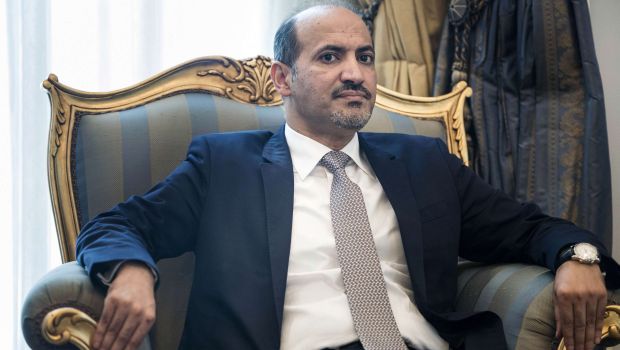
Ahmad Jarba, leader of Syrian National Coalition, waits for a meeting with U.S. Secretary of State John Kerry at King Abdulaziz International Airport in the Saudi city of Jeddah June 27, 2014. (REUTERS/Brendan Smialowski/Pool)
The Coalition, the most prominent umbrella group of Syrian opposition movements, is in the middle of a three-day meeting in Istanbul aimed at choosing a new president and discussing the recent offensive by the Islamic State of Iraq and Syria (ISIS), which is currently in control of swathes of eastern Syria along the border with Iraq.
The Coalition failed to agree on a replacement for current president Ahmed Al-Jarba on Sunday, but will press ahead with fresh attempts on Monday and Tuesday, said Coalition member Ahmed Ramadan.
Jarba has served two six-month terms, and is barred from serving more under the Coalition’s own rules.
Another Coalition member, Fayez Sarah, told Asharq Al-Awsat: “The meeting was adjourned until Monday when the election will take place.”
He said he believed Hadi Al-Bahra, who led the Coalition’s delegation to the Geneva II negotiations in February, was the current favorite for the presidency.
According to reports, Bahra emerged as a frontrunner after the Coalition’s former secretary-general, Mustafa Al-Sabbagh, broke ranks with allies from the Syrian Muslim Brotherhood and struck an agreement with Jarba to back Bahra—one of Jarba’s confidants—for the presidency of the Coalition, in exchange for Jarba’s backing for the election of a secretary-general from Sabbagh’s bloc.
Sarah, a member of Jarba’s Democratic Bloc, said on Sunday that the election would take place on Monday, and also confirmed the newly formed alliance between Jarba and Sabbagh’s blocs.
Sarah told Asharq Al-Awsat: “Since we joined the Coalition we have tried to form alliances within the Coalition to strengthen the unity of the opposition and facilitate everything needed to serve the revolution.”
“The Democratic Bloc only has 20 members, which means we were unable to be influential in the Coalition except after we made alliances, which started with the alliance with the Free Syrian Army (FSA),” he added. “Today we entered into a wider alliance with the Sabbagh bloc, which gives all parts of the alliance more weight.”
However, the Coalition remains deadlocked over the issue of its support for the interim government it previously created to administer Syrian territory held by the opposition. The interim government and the Coalition have clashed on various issues, and both have been overshadowed by the growth of the influence of Islamist militant groups on the ground in Syria, including ISIS.
Within the Coalition there have been growing calls for the withdrawal of confidence in the interim government led by Ahmad Tu’mah and the creation of a new body. This follows clashes between Tu’mah and Jarba over the FSA’s Supreme Military Council, which Tu’mah ordered to be disbanded, a move opposed by Jarba.
Ramadan told Asharq Al-Awsat that suggestions by figures close to the head of the Coalition to form a “military government” led by members of the groups fighting to bring down the Syrian regime “faced opposition” from members of the Coalition, including the Syrian National Council.
He said: “We also rejected it outright and we consider any violation against the government or calls to form a military government to be a red line.”
